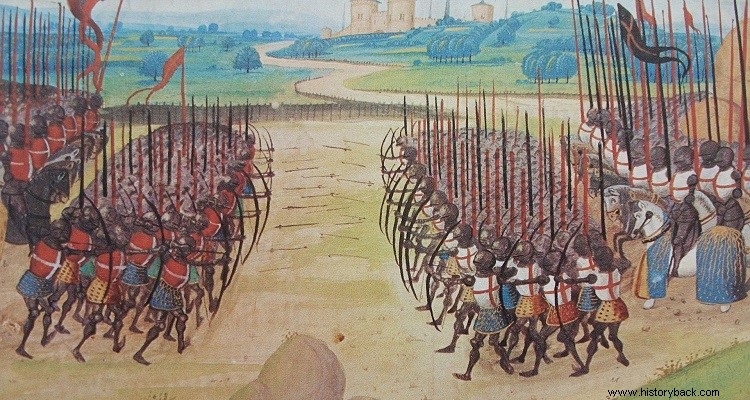
The Hundred Years War was the longest-running military conflict in Europe and one of the longest-running of all time. To be precise, it lasted 116 years, from 1337 to 1453, with breaks though.
The main cause of the war was the pursuit of the English Plantagenet dynasty to dominate French lands which they claimed by hereditary right.
In 1328, King Charles IV of France died without leaving an heir. Thus the throne was claimed by his cousin Philip of Valois, who was proclaimed king, as Philip VI, but also by Edward III of England, nephew of the deceased French king.
The war was fought in four phases. The first spans the period 1337-1360 and ended with the complete dominance of the English, who under the famous Black Prince Edward , they seized vast areas in France and crushed the French Army in the famous battles of Crecy , in 1346 and of Poitier , in 1356.
The second phase of the war took place during the years 1364-80 . In this period, under the enlightened leadership of Charles E, the French, led by the short-stable de Gueslain, recovered almost all the English possessions in southwestern France. The English kept only their possessions at Calais and the Norman coast of the English Channel.
The third phase began in 1381 and lasted until 1428. Again the English, under Henry V again dominated France, crushing the French at the Battle of Agincourt in 1415 . The fourth and final phase began in 1429 and ended in 1453 with the French fighting back again, inspired by the famous Joan of Lorraine , and to finally and definitively crush the English, who held Calais for about 100 more years.
The Hundred Years War did not only concern England and France. Gradually, in one way or another, all Western European powers, from Scotland to Genoa, Portugal, the Spanish kingdoms of Castile and Aragon, the kingdom of Navarre, and also the duchies became involved in it. of Flanders and Burgundy and the kingdom of Bohemia, still – still.
This warcoincided with the spread of the "Black Death", the great bubonic plague epidemic in western Europe, maximizing its devastating effects. At the same time, however, there was also a war where firearms appeared and were used a lot on the battlefields and in siege operations.
It was also the war where the English longbow, at first triumphed, but then succumbed to the superiority of firearms, which the French mostly used in its final phase.
Another important impact of the war was the creation of French national consciousness. The Hundred Years' War began as a conflict of feudal lords and ended in a conflict of nations and was the generative cause of the nation states of France and England.
